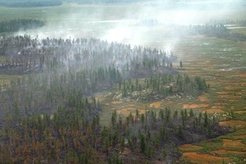Carbon in permafrost soils: CarboPerm network granted

Almost one fourth of the Northern hemisphere’s landcover is permanently frozen. Such permafrost soils, as found in Siberia, store huge amounts of carbon since several thousand years. Does warming of the arctic lead to thawing of the Siberian permafrost soils? What amounts of carbon will be released, as carbon dioxide or methane, once the soils thawed? How does this impact the overall atmospheric content of greenhouse gases?
To answer these questions, the German Ministry for Research has recently funded the German-Russian cooperation project CarboPerm by providing 4.5 Mio Euro for the next three years.
Two departments of MPI-BGC take part in this network: Martin Heimann’s department will characterize and quantify the processes driving carbon fluxes in two Siberian permafrost sites. Markus Reichstein’s department will model CO2 budgets and CH4 emissions on regional to global scales by including ecosystem processes, to improve understanding of the overall greenhouse gas balance.
The studies will be jointly performed with Russian partners. German partners of the network include Alfred-Wegener-Institut für Polar- und Meeresforschung, the universities of Hamburg, Köln and Potsdam, Helmholtz-Center Potsdam Deutsches GeoForschungsZentrum, Max-Planck Institute for Meteorology in Hamburg, TU Bergakademie Freiberg and Leibniz-Institut für Angewandte Geophysik.












